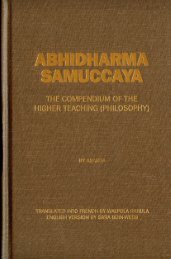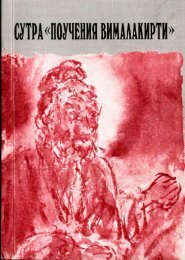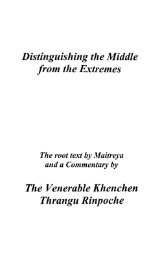ABHISAMAYALAMKARA
ABHISAMAYALAMKARA
ABHISAMAYALAMKARA
You also want an ePaper? Increase the reach of your titles
YUMPU automatically turns print PDFs into web optimized ePapers that Google loves.
286. ANALYSIS OF<br />
[Ibid.] sa-mtshams iheg-chen<br />
k^i sahi bar-ro*<br />
mthoh-lam-nas sahs-<br />
THE <strong>ABHISAMAYALAMKARA</strong> 287<br />
THE OMNISCIENCE IN REGARD OF THE EMPIRICAL WORLD<br />
WHICH IS FAR FROM THE CLIMAX OF WLSDOM AND THAT<br />
WHICH IS NEAR TO IT ACCORDING TO THE ABHIS. ALOKA.<br />
When an object, miraculously produced by a<br />
magician, makes its appearance, a person that does not<br />
know the true nature of such an object, imagines it to be<br />
real and does not possess the notion of its being devoid<br />
of an essence of its own. In a similar manner, the Sravakas<br />
etc., being deprived of a spiritual teacher and of<br />
the right means of action, 1 cognize (the elements of<br />
existence) as having a separate differentiated reality.<br />
Owing to the presence of this realistic conception, i.e. of<br />
an **a ttach'ment" (towards the phenomenal elements)<br />
which is essentially incorrect, the Hlnayanists do<br />
not possess the knowledge of the true nature of things, 2<br />
and the cognition of the Ultimate Transcendental Unity<br />
(of the Universe) does not exist with them. They are<br />
therefore far from the Mother of t # he<br />
Buddha (the Climax of Wisdom).<br />
On the contrary, the Bodhisattvas have completely<br />
done away with the differentiation of separate entities<br />
which is the cause of the error of realistic imputation. 3<br />
With them the full cognition of Matter and all the other<br />
elements of existence means the cognition of<br />
their Ultimate Unity. For this reason they<br />
are near to the Mother of the<br />
Buddha.<br />
[Abhis. aloka, MS. 198b. 5-13,]<br />
1 Cf. above Chapter I (nirvedha-bhagiya in general and satnparigraha).<br />
2 Rnam-bsad, 183a. 5-6. dnos-pohi no-bo bden-ston spros-hral<br />
mi ses-pa-rnams-la.—They do not know trie true essence of things<br />
which is the negation of all separate reality and of all plurality<br />
whatsoever,<br />
3 Cf. Uttaratantra, Transl. p. 171.<br />
[Sphut. 40a. 6-b 5.] sgyu-ma-mhhangyis sprul-bahi<br />
dnos-po $nan~ba-la dehi rah-gi-ho-bo mi-ses-pas< dnospor<br />
mhon-par~£en~pa~nid-]iyis no-bo-ntd-med-par mi-snan<br />
ba-bzin-du dge-bahi bses-gnen~la-sogs-pm thabs-m^has-pa<br />
dan-brahbahi-phyir dnos-po mtshan-ma-dan-ldan-par<br />
rtogs~pas nan-thos4a-sogs~pa dnos-pohi no-bp mi-ses-parnams-la<br />
mnam-pa-nid-l^i ye-ses de med-de. dehi-phyir<br />
de-dag4a rgyal-bahi yum tin-bar-gynr-te, byah-chubsems-dpah<br />
dus-rin-mo-zig-nas dge-bahi bses-gfien yahdag-par<br />
mgu-bar-byas-pahi man-hag phyin-ci-ma-log-pacan-bden-parghis-la<br />
rten-pahi thos-pa-la-sogs-pahi sespa<br />
skye~bahi thabs-la-mkhas-p0s dhos-por mnon-par-zenpahi<br />
hkhrul-pahi mtshan-ma bsdl-ba-rnams-la-ni gzugs-lasogs<br />
-pahi chos yons-su-ses-pm de-nid mnam-pa-fiid-du<br />
yons-su-ses-pa yirt-te, dehi-phyir de-dag-la yum-hdi yahdag-par<br />
ne-bar-hgyur-ba (ho). 1<br />
1 Pane. II. 267b. 7-268a. 6. = Ast. 189. 22-190.7.—In the Rnambsad<br />
this passage of the Sphut is put into the form of a chain of<br />
syllogisms ace. to the methods of "sequence and reason" (thai phyir).<br />
So we have : (1) The 5ravaka and Pratyeka Buddha Saints are far<br />
from the Climax of Wisdom, because with the Sravakas etc. who<br />
do not know the true nature of things, i.e. their Relativity and<br />
Ultimate Unity, the Knowledge of the Unity (jthe equality and<br />
relativity) of present, past, and future does not exist, (nan-ran<br />
hphags-pa de-dag-la rgyal~bahi~yum rin-bar-gyur-to. nan~thos-la-sog&«<br />
pa dnos-pohi no bo bd&n-stoh sprosbral mi-ses-pa-rnams-la dm<br />
gsum nmam-pa-nid-lftfi yes-ses rned-pa dehi-phyir)^ (2) This is right<br />
(i.e. it is right that the knowledge of the relative character of<br />
present, past, and future does not exist with the Hlnayanists, because<br />
they cognize all the (empirical objects) as endowed with a separate<br />
differentiated reality (der-ihal de-dag-gis dnos-po bden grub-\yi<br />
mtshan-ma-dan-ldan-par rtogs-pas-so). (3) This


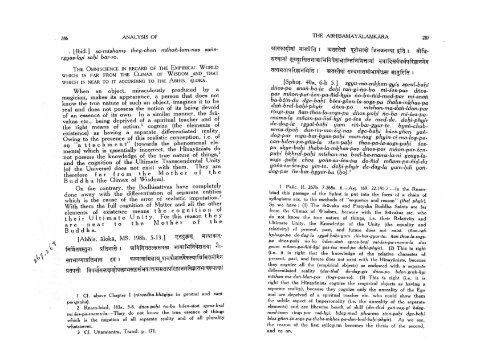
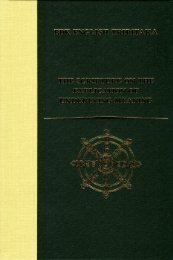
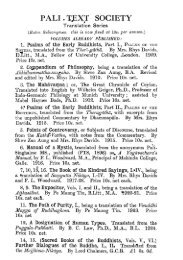
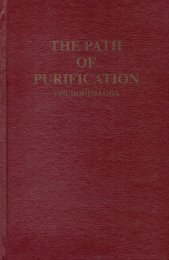
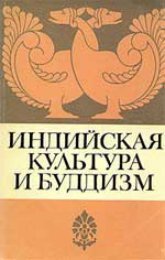
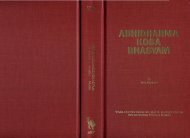


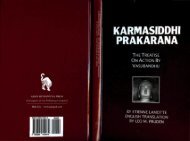
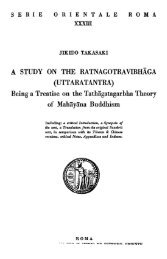
![Long Discourses of the Buddha [Digha Nikaya]](https://img.yumpu.com/32792419/1/164x260/long-discourses-of-the-buddha-digha-nikaya.jpg?quality=85)
